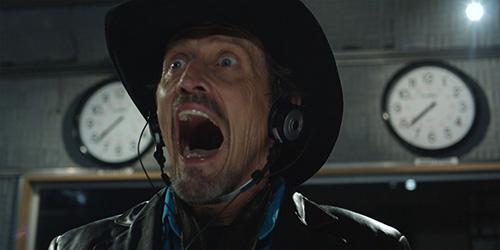
Pontypool (Movie Review)
William S. Burroughs warned us all that “language is a virus from outer space.” The origins of the zombie-spawning virus in “Pontypool” are never revealed as extraterrestrial or otherwise but it does seem that the contagion lives inside language, infects the brain and turns otherwise rational Canadians into walking, homicidal mental glitches. It’s almost a shame that “Pontypool” has been marketed as a zombie movie because that association creates expectations that are bound to lead to disappointment for the crowd hoping for anything approaching a traditional zombie movie. Instead of brain-munching and aiming for the head they’re going to find a claustrophobic, action-light, stage-bound movie that starts out talky, transitions to little-to-no dialogue and finishes with mighty bursts of foreign languages and gibberish.
Pontypool is a tiny village in southern Ontario where having a historic grain elevator is the closest thing it has to a claim to fame. In the film, it’s also the home of morning talk radio DJ Grant Mazzy. Along with a skeleton crew of a producer, an engineer and a traffic reporter (who broadcasts live from the “Sunshine Chopper” which, in actuality, is his Dodge Dart parked on a hill with helicopter sound effects), Mazzy covers the school closings and obituaries that pass for news in a small town, all while trying to push the envelope with “edgy” shock jock tactics.
On this particular morning, reports begin pouring in of a mob of people rushing a doctor’s office and eventually escalating into a deadly riot. Soon the authorities are uncontactable, mysterious messages in French are breaking into their signal and Mazzy finds himself being interviewed live on the BBC. In the tiny radio station (located in the basement of a church) the three realize that society is collapsing outside and that this chaos is shifting from something they’re hearing about second-hand to a very real danger that they can’t hide from, even in the safety of their sound-proof studio.
“Pontypool” is, quite literally, a zombie movie like you’ve never seen before. Actually, compared to most other zombie movies, you hardly see anything at all. This story is told through words, not actions, and often feels more like a radio play than a movie. In fact, when author Tony Burgess adapted the screenplay from his novel “Pontypool Changes Everything”, he simultaneously adapted it to a radio play. Orson Welles’s famous “War of the Worlds” broadcast was a primary influence on the style of the film and telling the story of a zombie attack through the mind’s eye rather than showing it in all its full gut-munching glory actually makes for a chillingly realistic and highly unique experience.
Surprisingly, the zombies are hardly even shown in the film and the body count is miniscule. While we don’t see much of the zombies, there’s a constant sense that they are just outside the door causing unimaginable mayhem that at any instant could spill over into the safety of the radio station. The fact that we don’t see these scenes but only hear about them second-hand from people calling into the station only adds to the atmosphere of creeping dread.
Midway through the movie there is a shameless deus ex machina in the form of a character who literally crawls in through a window, delivers a lot of exposition and introduces the premise that the zombie virus has infected the English language and is being spread by verbal communication and then crawls out another window. It’s an inelegant way to advance the story but it comes at the right time and gives us just enough of an explanation to keep us clued in on what is going on. When similar movies have had to resort to delivering exposition through guys in bunny suits and Mark Wahberg in middle-school science teacher mode, it’s easy to forgive the silliness and convenience of Dr. Explainy popping by out of nowhere.
“Pontypool” is a fairly weird movie throughout but the end gets really weird (be sure to pay attention during the credits and stick around afterwards). The word is that the movie was conceived as a trilogy and that a sequel called “Pontypool Changes” is forthcoming. It might sound like I’m damning the movie with faint praise, but the ending of “Pontypool” somehow reminded me of watching the end of “The Matrix” for the first time and realizing that I had only seen a tiny glimpse into what could be a much more expansive story. If “Pontypool” does end up being the opening chapter in a larger story, let’s hope the follow-ups can live up to the promise of the original. As it stands on its own, “Pontypool” is a zombie film like no other that will probably be loved and hated with equal fervor.

